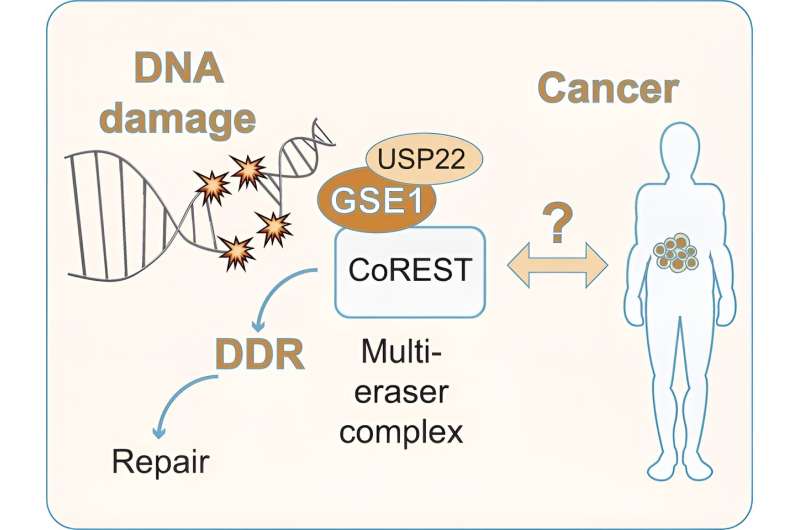This article has been reviewed according to Science X's editorial process and policies. Editors have highlighted the following attributes while ensuring the content's credibility:
fact-checked
peer-reviewed publication
trusted source
proofread
Researchers discover protein complex that controls DNA repair

The repair of damage to genetic material (DNA) in the human body is carried out by highly efficient mechanisms that have not yet been fully researched. A scientific team led by Christian Seiser from MedUni Vienna's Center for Anatomy and Cell Biology has now discovered a previously unrecognized control point for these processes.
This discovery could lead to a new approach for the development of cancer therapies aimed at inhibiting the repair of damaged cancer cells. The research work was recently published in the journal Nucleic Acids Research.
GSE1-CoREST is the name of the newly discovered complex that contains three enzymes that control DNA repair processes and could form the basis for novel cancer therapeutics. "In research, these proteins are already associated with cancer, but not in the context that we have now found," emphasizes Seiser, who led the study in close collaboration with researchers from the Max Perutz Labs Vienna.
The new complex was identified as a controller of DNA repair processes using a precise measurement method (affinity purification mass spectrometry). "This also showed that the inhibition of these enzymes can prevent the repair of genetic material and cause the death of cells," says first author Terezia Vcelkova from MedUni Vienna's Center for Anatomy and Cell Biology describing a highly desirable effect in tumor cells.
Stopping repair mechanisms
The genetic material, the DNA, is exposed to various harmful influences such as UV light or environmental pollutants on a daily basis. These influences can lead to changes in the DNA sequence, so-called mutations. To repair this damage to genetic material, various highly efficient biochemical repair mechanisms are normally activated. If these processes do not succeed in repairing the damage, programmed cell death (apoptosis) is ultimately initiated to protect against malignant cells.
To ensure their survival, cells react to DNA damage by activating and integrating signaling pathways or signaling cascades. This is achieved in particular through the activation of signaling pathways known as DNA damage response (or DDR). These signaling cascades are responsible for bringing repair factors to the right place in the genome at the right time in order to repair the mutated DNA efficiently and promptly.
The control instances and regulators in this interaction are better defined thanks to the current research work. "The effectiveness of the novel cancer therapeutics based on this, which are intended to improve the response of tumor cells to cancer therapies, is now being tested in preclinical studies," says Seiser.
More information: Terezia Vcelkova et al, GSE1 links the HDAC1/CoREST co-repressor complex to DNA damage, Nucleic Acids Research (2023). DOI: 10.1093/nar/gkad911
Journal information: Nucleic Acids Research
Provided by Medical University of Vienna

















